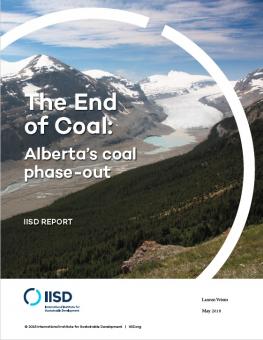
The End of Coal: Alberta's coal phase-out
Alberta implements one of the most ambitious coal phase-outs the world over. What are the politics and economics behind it? Learn more from our new report.
In November 2015, the Canadian province of Alberta committed to a phase-out of coal power by 2030. The phase-out of coal power in Alberta will involve the retirement of over 40 per cent of Alberta’s 2016 installed capacity and the de facto phase-out of local thermal coal mines.
Alberta's coal phase-out is part of the province's wider Climate Leadership Plan. To implement the phase-out, Alberta's NDP government relies on three pillars. First, the government announced a CAD 1.1 billion payout to coal power companies under Off-Coal Agreements that aim to ensure political longevity and foster a positive investment climate. Second, CAD 45 million has been allocated in programming to transition coal workers and communities. The funding for Off-Coal Agreements and transition support to workers and communities comes from carbon tax revenues. Third, Alberta launched a new electricity market design to bring in replacement power. While public opinion is still divided, Alberta’s solution gained the support of organized labour, power companies, public health advocates, environmental non-governmental organizations and the federal government.
This paper explores the circumstances leading to the phase-out and the actions taken by affected players for those who may draw inspiration and lessons from Alberta: policy-makers, campaigners, environmental groups, the coal industry and others transitioning to a low-carbon economy in Canada and the world over.
You might also be interested in
Powering the Clean Energy Transition: Net-Zero electricity in Canada
This brief explains how a shift to clean power generation can offer affordable, reliable electricity, benefiting households and businesses alike.
IISD Welcomes Draft Regulations for Oil and Gas Pollution Cap
A firm cap on emissions can provide certainty for industry to invest in decarbonization, while ensuring the sector is on a path to net-zero by 2050.
Canada's Sustainable Jobs Legislation: A milestone for workers and communities on the path to net-zero
IISD celebrates the Canadian Sustainable Jobs Act, Bill C-50, being officially passed into law as a significant milestone to engage and support workers and communities in moving to a low-carbon economy.
Why Liquefied Natural Gas Expansion in Canada Is Not Worth the Risk
An analysis of the economic and environmental risks of liquified natural gas expansion in Canada.